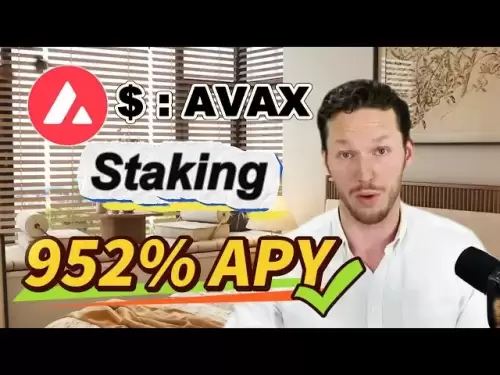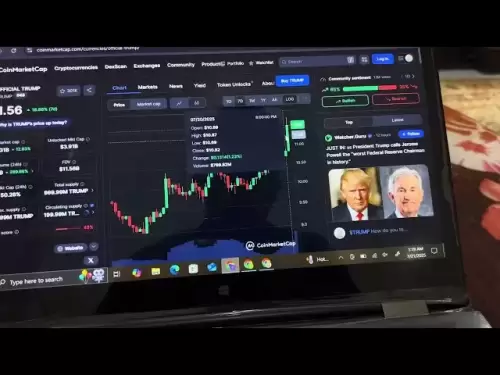-
 Bitcoin
Bitcoin $118400
0.39% -
 Ethereum
Ethereum $3814
2.17% -
 XRP
XRP $3.547
1.34% -
 Tether USDt
Tether USDt $1.000
0.00% -
 BNB
BNB $769.5
2.95% -
 Solana
Solana $191.7
6.36% -
 USDC
USDC $0.9999
0.01% -
 Dogecoin
Dogecoin $0.2722
7.75% -
 Cardano
Cardano $0.8995
5.59% -
 TRON
TRON $0.3158
-0.78% -
 Hyperliquid
Hyperliquid $47.37
4.46% -
 Stellar
Stellar $0.4848
3.54% -
 Sui
Sui $4.031
1.72% -
 Chainlink
Chainlink $20.11
3.94% -
 Hedera
Hedera $0.2832
3.16% -
 Avalanche
Avalanche $26.20
4.27% -
 Bitcoin Cash
Bitcoin Cash $530.5
0.67% -
 Shiba Inu
Shiba Inu $0.00001568
3.59% -
 Litecoin
Litecoin $118.4
1.42% -
 UNUS SED LEO
UNUS SED LEO $8.976
-0.23% -
 Toncoin
Toncoin $3.349
2.54% -
 Polkadot
Polkadot $4.590
2.54% -
 Uniswap
Uniswap $10.56
-0.59% -
 Ethena USDe
Ethena USDe $1.001
0.00% -
 Monero
Monero $327.7
0.39% -
 Pepe
Pepe $0.00001422
2.62% -
 Bitget Token
Bitget Token $4.973
-1.22% -
 Dai
Dai $1.000
0.02% -
 Aave
Aave $331.9
1.59% -
 Bittensor
Bittensor $429.6
-0.56%
Can you rent an NFT?
Renting an NFT allows temporary access to its utility without ownership transfer, often used for virtual experiences or gaming, facilitated through smart contracts on platforms like ReNFT or IQ Protocol.
Jul 09, 2025 at 03:21 pm
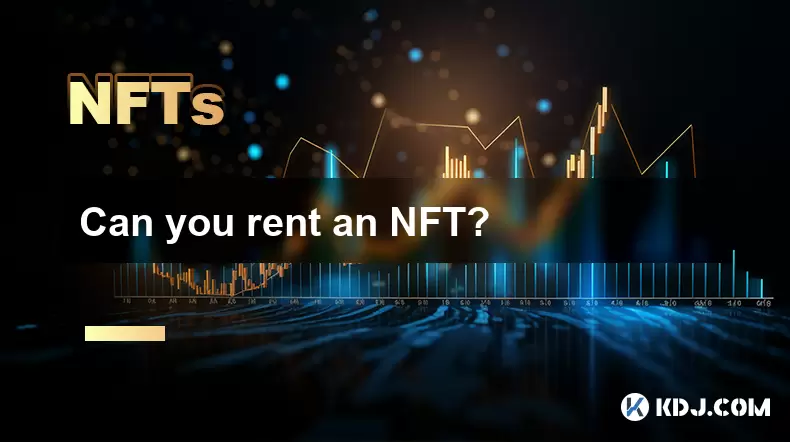
What Does It Mean to Rent an NFT?
The concept of renting an NFT might seem foreign at first, especially since the core idea behind NFT ownership is digital scarcity and exclusivity. However, renting an NFT refers to temporarily transferring the usage rights or access privileges of a non-fungible token without changing its ownership. This process allows individuals or entities to use the NFT for a limited time, often for purposes like virtual exhibitions, gaming avatars, or metaverse experiences.
In traditional terms, renting implies that the original owner retains full control and title over the asset while granting temporary access. When applied to NFTs, this means the smart contract governing the NFT can be configured to allow time-bound permissions or utility access. The underlying blockchain ensures transparency and traceability during the rental period.
How Can You Rent an NFT?
Renting an NFT typically involves several technical and procedural steps. First, both parties must agree on the terms of the rental, including duration, cost, and any restrictions. These agreements are usually encoded into smart contracts that automatically enforce the conditions once deployed.
Here’s how the process generally unfolds:
- A platform or marketplace supports NFT rentals.
- The NFT owner lists their asset with a rental price and time frame.
- The renter selects the NFT and pays the rental fee, which is often locked in a smart contract.
- The contract transfers temporary access rights to the renter, possibly through a proxy wallet or escrow service.
- Once the rental period ends, the rights revert back to the owner automatically.
Some platforms also offer NFT lending protocols, where users can deposit collateral to gain temporary access to high-value NFTs. These systems help mitigate risks such as theft or misuse by ensuring both parties fulfill their obligations before access is granted.
Which Platforms Support NFT Rentals?
Several emerging platforms and decentralized applications (dApps) now support NFT rental functionalities. Among them are:
- ReNFT: A decentralized NFT rental protocol built on Ethereum. It enables users to rent out their NFTs using a sub-rental model and escrow system.
- IQ Protocol: Developed by ParaSpace, this protocol allows for NFT leasing and borrowing, integrating with various DeFi tools.
- Double Finance: A cross-chain NFT rental solution that focuses on usability and security, supporting multiple blockchains.
- Rentfuse: A platform designed specifically for short-term NFT rentals, often used in gaming and metaverse environments.
Each of these platforms has its own set of rules and interfaces for facilitating NFT rentals. Users should carefully review gas fees, contract terms, and security audits before engaging in rental transactions.
What Are the Risks Involved in Renting NFTs?
Like any blockchain-based transaction, renting NFTs carries certain risks that participants should be aware of. One major concern is scam activity, where malicious actors may list counterfeit or unauthorized NFTs for rent. Due diligence is essential when selecting rental assets and verifying ownership.
Another risk lies in smart contract vulnerabilities. If the code governing the rental agreement contains bugs or exploits, it could lead to loss of funds or unauthorized access. Users should only interact with well-audited and reputable platforms.
Additionally, collateral requirements can pose a barrier for some renters. Many NFT rental services require users to lock up cryptocurrency as collateral, which may not always be feasible. There's also the issue of temporary utility limitations—a rented NFT may not grant full access to all features or benefits enjoyed by the actual owner.
Can You Rent Out Your NFT on OpenSea?
As of now, OpenSea, the largest NFT marketplace, does not natively support NFT rentals. Its primary function remains the buying, selling, and trading of NFTs through standard listings like fixed-price sales or auctions.
However, third-party solutions have emerged that enable NFT owners to rent out their OpenSea-listed NFTs indirectly. These include wrapping the NFT into a rentable tokenized form or using external platforms that integrate with OpenSea's API. In such cases, the rental occurs off-platform, meaning OpenSea itself doesn’t facilitate or track the rental activity.
Users who wish to rent out their OpenSea NFTs must explore compatible dApps or protocols that specialize in NFT rentals. It's crucial to ensure that the NFT is compatible with the chosen rental protocol and that the necessary permissions are granted via approval transactions on the blockchain.
Frequently Asked Questions
Q: Is renting an NFT legal?
A: Yes, renting an NFT is legal as long as it complies with the smart contract terms and applicable laws. Since NFTs represent digital ownership, renting them is akin to licensing intellectual property for temporary use.
Q: Can I rent an NFT without locking up collateral?
A: Some platforms allow rentals without requiring collateral, but they are rare. Most rental services demand collateral to protect against fraud or misuse, especially for high-value NFTs.
Q: Do I get royalties if someone rents my NFT?
A: Royalties are typically tied to secondary sales, not rentals. Unless the rental platform includes a royalty mechanism in its smart contract, you won’t receive ongoing royalties from rental activities.
Q: How do I know if my NFT is eligible for rental?
A: Check the NFT's metadata and the platform's compatibility. Most ERC-721 and ERC-1155 tokens can be rented, provided the smart contract allows for approval delegation and interaction with rental protocols.
Disclaimer:info@kdj.com
The information provided is not trading advice. kdj.com does not assume any responsibility for any investments made based on the information provided in this article. Cryptocurrencies are highly volatile and it is highly recommended that you invest with caution after thorough research!
If you believe that the content used on this website infringes your copyright, please contact us immediately (info@kdj.com) and we will delete it promptly.
- Toshi.bet: Leading the Crypto Casino Revolution in Poland 2025
- 2025-07-21 20:30:12
- Tether Gold (XAU₮) Expands: Mobee Indonesia & Tokenized Gold's Rising Tide
- 2025-07-21 20:50:12
- BlockDAG's Launch Access: No Vesting, Maximum Opportunity!
- 2025-07-21 21:30:12
- Altcoin Season Heats Up: Cardano Outperforms After Bitcoin Stabilizes
- 2025-07-21 20:50:12
- BlockchainFX: The 1000X Potential Crypto SHIB and DOGE Holders Are Eyeing
- 2025-07-21 21:30:12
- Delhi High Court and the Curious Case of the Missing ₹50 Coin
- 2025-07-21 21:35:13
Related knowledge
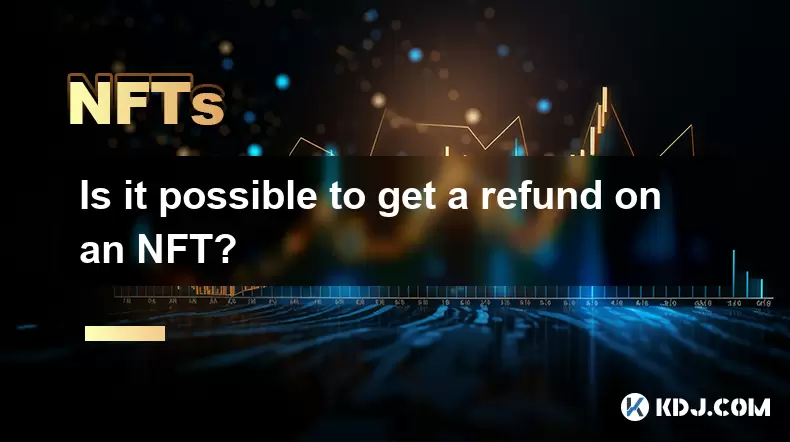
Is it possible to get a refund on an NFT?
Jul 21,2025 at 08:35pm
Understanding NFT Transactions and RefundsWhen you purchase an NFT (Non-Fungible Token), the transaction is typically recorded on a blockchain, making...
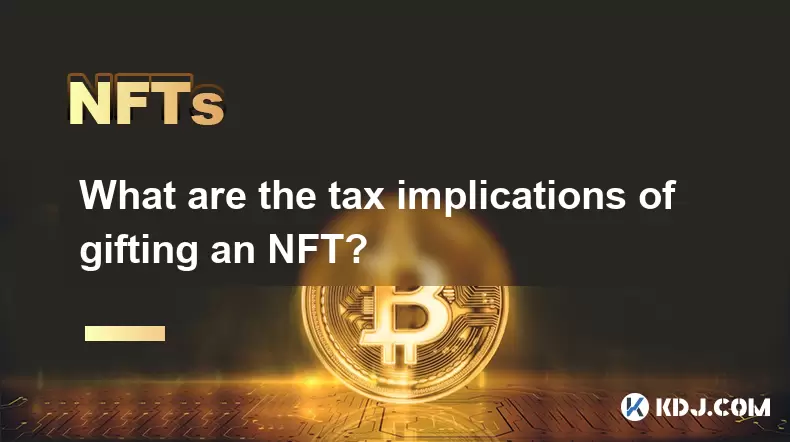
What are the tax implications of gifting an NFT?
Jul 19,2025 at 04:21am
Understanding the Basics of NFT GiftingGifting a Non-Fungible Token (NFT) involves transferring ownership from one individual to another without recei...
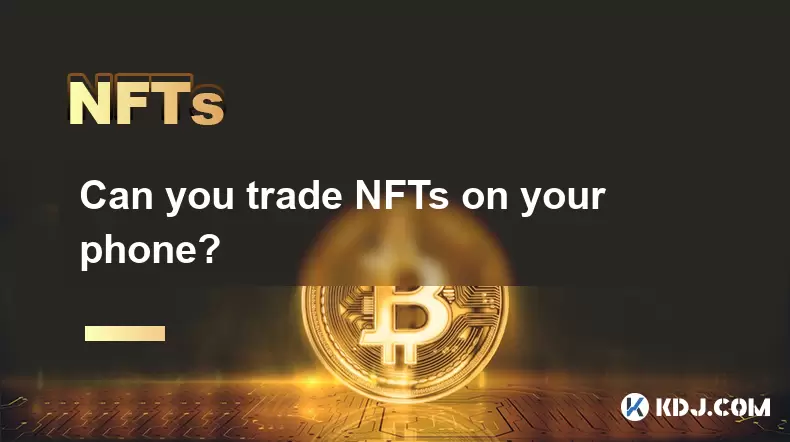
Can you trade NFTs on your phone?
Jul 18,2025 at 04:29am
Trading NFTs on Mobile DevicesYes, you can trade NFTs on your phone, and the process has become increasingly streamlined thanks to a variety of mobile...
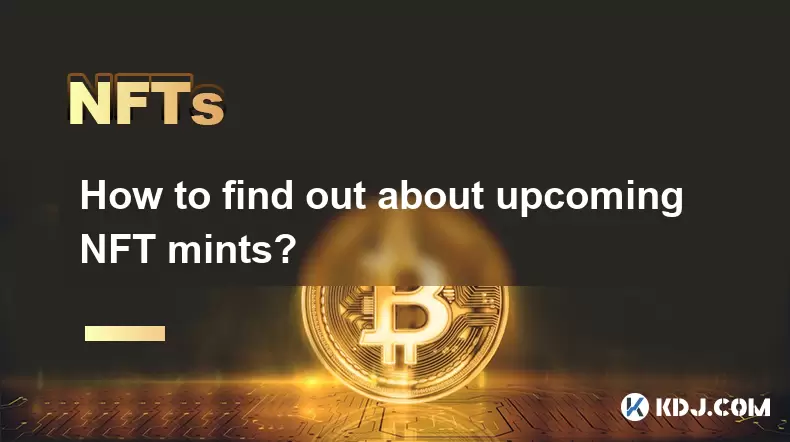
How to find out about upcoming NFT mints?
Jul 18,2025 at 11:50am
Exploring NFT Minting OpportunitiesUnderstanding the landscape of upcoming NFT mints is crucial for collectors, investors, and creators who wish to st...
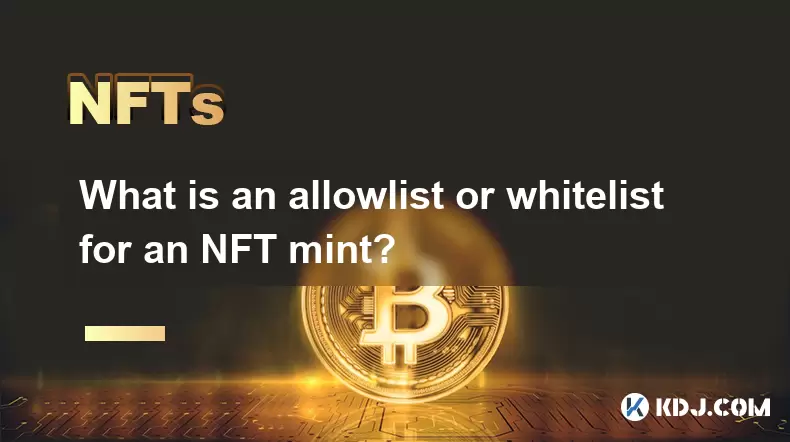
What is an allowlist or whitelist for an NFT mint?
Jul 20,2025 at 07:14pm
Understanding the Concept of an Allowlist for NFT MintingAn allowlist, also commonly referred to as a whitelist, is a mechanism used in the NFT mintin...
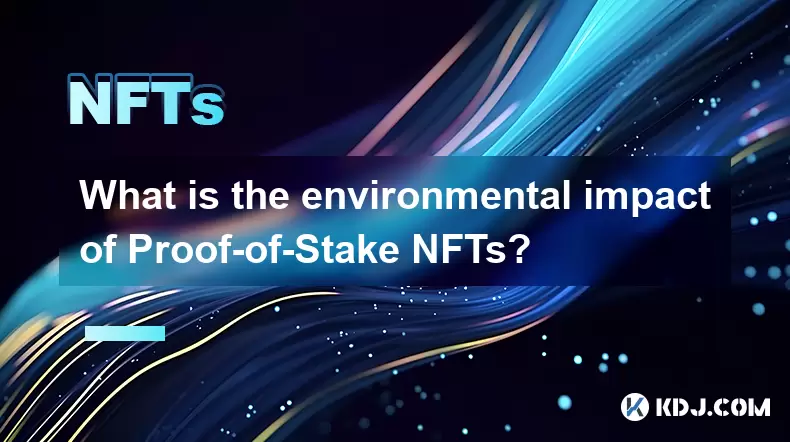
What is the environmental impact of Proof-of-Stake NFTs?
Jul 17,2025 at 07:14pm
Understanding the Basics of Proof-of-Stake NFTsProof-of-Stake (PoS) is a consensus mechanism used by blockchain networks to validate transactions and ...

Is it possible to get a refund on an NFT?
Jul 21,2025 at 08:35pm
Understanding NFT Transactions and RefundsWhen you purchase an NFT (Non-Fungible Token), the transaction is typically recorded on a blockchain, making...

What are the tax implications of gifting an NFT?
Jul 19,2025 at 04:21am
Understanding the Basics of NFT GiftingGifting a Non-Fungible Token (NFT) involves transferring ownership from one individual to another without recei...

Can you trade NFTs on your phone?
Jul 18,2025 at 04:29am
Trading NFTs on Mobile DevicesYes, you can trade NFTs on your phone, and the process has become increasingly streamlined thanks to a variety of mobile...

How to find out about upcoming NFT mints?
Jul 18,2025 at 11:50am
Exploring NFT Minting OpportunitiesUnderstanding the landscape of upcoming NFT mints is crucial for collectors, investors, and creators who wish to st...

What is an allowlist or whitelist for an NFT mint?
Jul 20,2025 at 07:14pm
Understanding the Concept of an Allowlist for NFT MintingAn allowlist, also commonly referred to as a whitelist, is a mechanism used in the NFT mintin...

What is the environmental impact of Proof-of-Stake NFTs?
Jul 17,2025 at 07:14pm
Understanding the Basics of Proof-of-Stake NFTsProof-of-Stake (PoS) is a consensus mechanism used by blockchain networks to validate transactions and ...
See all articles

























